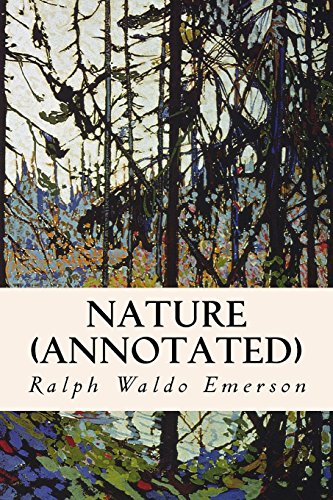Items related to Nature (annotated)

Nature is an inspiring nature essay and philosophy classic by Ralph Waldo Emerson. "Emerson defines nature as an all-encompassing divine entity inherently known to us in our unfettered innocence, rather than as merely a component of a world ruled by a divine, separate being learned by us through passed-on teachings in our experience."--WikipediaRalph Waldo Emerson (May 25, 1803 – April 27, 1882)[5] was an American essayist, lecturer, philosopher, and poet who led the transcendentalist movement of the mid-19th century. He was seen as a champion of individualism and a prescient critic of the countervailing pressures of society, and he disseminated his thoughts through dozens of published essays and more than 1,500 public lectures across the United States.Emerson gradually moved away from the religious and social beliefs of his contemporaries, formulating and expressing the philosophy of transcendentalism in his 1836 essay "Nature". Following this work, he gave a speech entitled "The American Scholar" in 1837, which Oliver Wendell Holmes Sr. considered to be America's "intellectual Declaration of Independence."[6]Emerson wrote most of his important essays as lectures first and then revised them for print. His first two collections of essays, Essays: First Series (1841) and Essays: Second Series (1844), represent the core of his thinking. They include the well-known essays "Self-Reliance",[7] "The Over-Soul", "Circles", "The Poet", and "Experience." Together with "Nature",[8] these essays made the decade from the mid-1830s to the mid-1840s Emerson's most fertile period. Emerson wrote on a number of subjects, never espousing fixed philosophical tenets, but developing certain ideas such as individuality, freedom, the ability for mankind to realize almost anything, and the relationship between the soul and the surrounding world. Emerson's "nature" was more philosophical than naturalistic: "Philosophically considered, the universe is composed of Nature and the Soul." Emerson is one of several figures who "took a more pantheist or pandeist approach by rejecting views of God as separate from the world. He remains among the linchpins of the American romantic movement,[10] and his work has greatly influenced the thinkers, writers and poets that followed him. "In all my lectures," he wrote, "I have taught one doctrine, namely, the infinitude of the private man."[11]Emerson is also well known as a mentor and friend of Henry David Thoreau, a fellow transcendentalist.Emerson was born in Boston, Massachusetts, on May 25, 1803,[13] a son of Ruth Haskins and the Rev. William Emerson, a Unitarianminister. He was named after his mother's brother Ralph and his father's great-grandmother Rebecca Waldo.[14] Ralph Waldo was the second of five sons who survived into adulthood; the others were William, Edward, Robert Bulkeley, and Charles.[15] Three other children—Phebe, John Clarke, and Mary Caroline—died in childhood.[15] Emerson was entirely of English ancestry, and his family had been in New England since the early colonial period. Emerson's father died from stomach cancer on May 12, 1811, less than two weeks before Emerson's eighth birthday.[17] Emerson was raised by his mother, with the help of the other women in the family; his aunt Mary Moody Emerson in particular had a profound effect on him.[18] She lived with the family off and on and maintained a constant correspondence with Emerson until her death in 1863. Emerson's formal schooling began at the Boston Latin School in 1812, when he was nine.[20] In October 1817, at 14, Emerson went to Harvard College and was appointed freshman messenger for the president, requiring Emerson to fetch delinquent students and send messages to faculty. Midway through his junior year, Emerson began keeping a list of books he had read and started a journal in a series of notebooks that would be called "Wide World".
"synopsis" may belong to another edition of this title.
- PublisherCreateSpace Independent Publishing Platform
- Publication date2015
- ISBN 10 1519294743
- ISBN 13 9781519294746
- BindingPaperback
- Number of pages56
- Rating
Buy New
Learn more about this copy
US$ 9.89
Shipping:
US$ 12.51
From United Kingdom to U.S.A.
Top Search Results from the AbeBooks Marketplace
Nature
Published by
Createspace Independent Publishing Platform
(2015)
ISBN 10: 1519294743
ISBN 13: 9781519294746
New
Paperback
Quantity: 1
Seller:
Rating
Book Description Paperback. Condition: Brand New. annotated edition. 56 pages. 9.00x6.00x0.13 inches. In Stock. Seller Inventory # zk1519294743
Buy New
US$ 9.89
Convert currency

